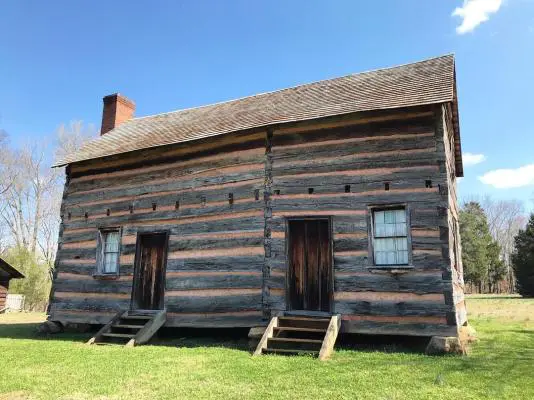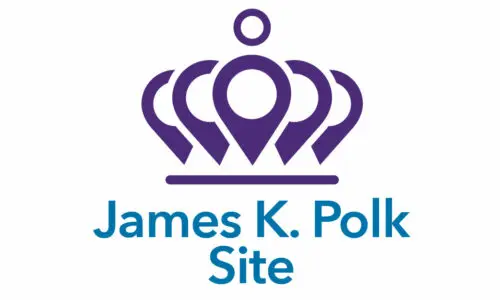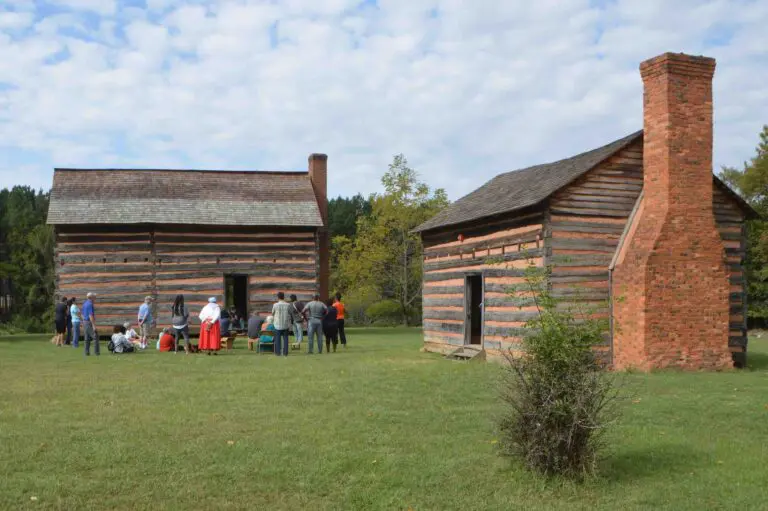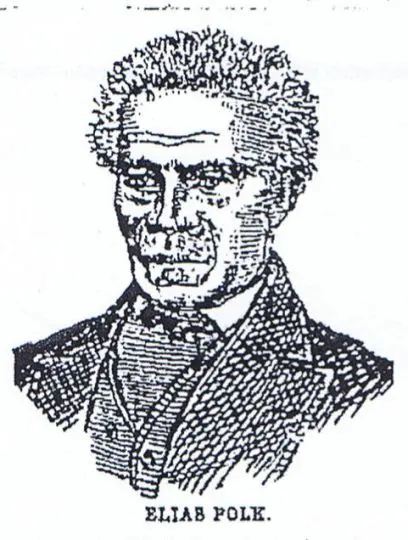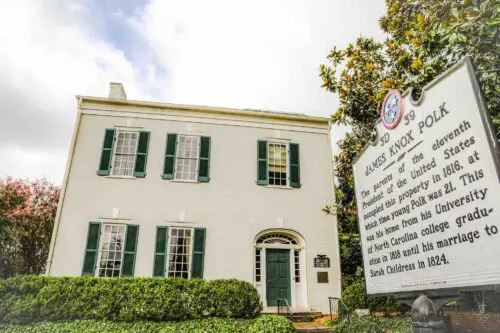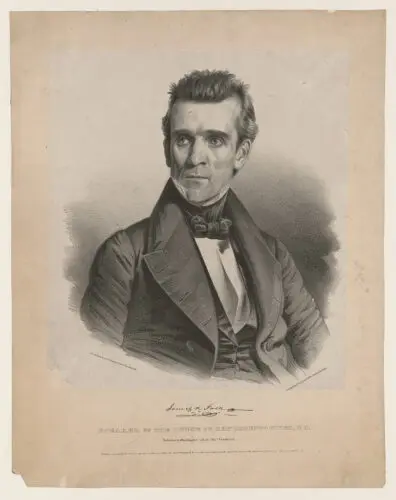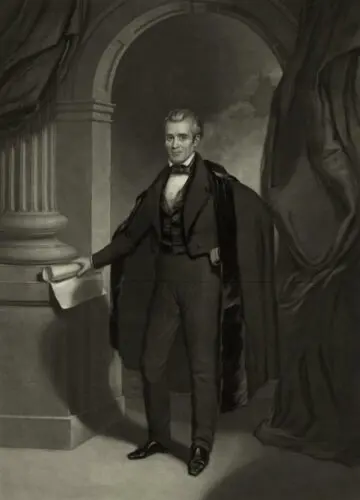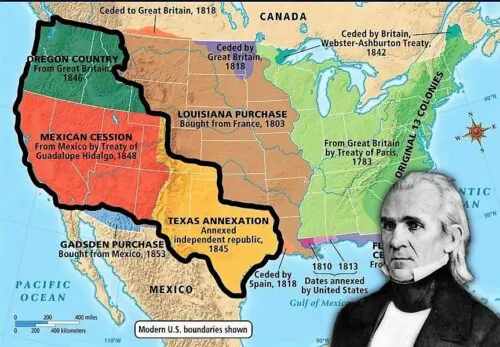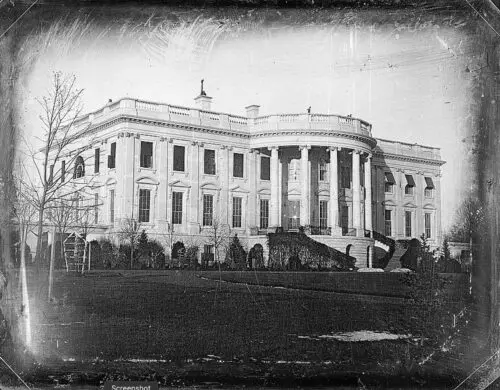Did you know that Mecklenburg County is the birthplace of the only president from North Carolina? James K. Polk was born in a log cabin Pineville, North Carolina, long before he became the 11th President of the United States.
The Polk family is of Scots-Irish descent and first settled in the United States in the 1720s in Cumberland County, Pennsylvania. Like many Scots-Irish located in Philadelphia at the time, the Polk family moved south to what would become Mecklenburg County via the Great Wagon Road that ran from Philadelphia to North Carolina.
The Polks first arrived in North Carolina in 1753 when Thomas Polk moved his family to Sugar Creek, near the Catawba River. Thomas Polk was an officer in the Continental Army during the Revolutionary War, a planter, and a politician. He was instrumental in the founding of Mecklenburg County and the town of Charlotte, becoming the Justice of the Peace for the county, a town commissioner, and the town’s first treasurer.
The Polks rose to prominence rather quickly. Ezekiel Polk, grandfather to the future President, was named a clerk in Tryon and was a soldier in the Revolutionary War. Samuel Polk, the father of James K. Polk, had amassed a 150-acre cotton farm in Mecklenburg County (Pineville) by the birth of his son on November 2, 1795. James Polk spent the first eleven years of his childhood in Pineville. The homestead had log buildings like the recreated ones at the James K. Polk Historic Site.
When James grew up in North Carolina, his family’s homestead was prosperous, the lands productive, and the Polks amassed a lot of wealth. Based on historical records, we know that between 1794 and 1806, the Polk family enslaved five people to their North Carolina property. Three of the five people have been named Violet, Lucy, and Elias Polk.
Violet and Lucy would have performed most of the domestic work on the farm, which would have included meeting Polk’s needs and those of the enslaved. Their work included maintaining the kitchen garden, cooking, laundry, preserving food, looking after the Polk children, and cleaning. They would have had a very active role in James Polk’s life.
James Polk descended from a line of wealthy planters who supported the system of slavery, which undoubtedly influenced his future political career. The Polks continued to be enslavers and planters even when they sold their North Carolina property and moved to Tennessee when young Polk was eleven.
Polk grew up in North Carolina and Tennessee, hearing Revolutionary War tales and developing a very patriotic mindset at a young age. He also heard political discussions from his parents and gained a deep sense of faith as a Presbyterian. His family wealth enabled him to attend excellent schools and afforded him the ability to attend UNC-Chapel Hill. When James Polk came of age, he became a lawyer before entering the political sphere at 27. He rose up the political ranks rather quickly, winning a seat in the Tennessee House of Representatives. Polk eventually became the Speaker of the United States House of Representatives in 1835 and ascended to the presidency in 1845.
His political career deeply reflected his early upbringing in North Carolina. He was a staunch believer in patriotism and an ardent supporter of “Manifest Destiny” as president of the United States. The United States grew the more under Polk’s presidency than under any other president. The Oregon Treaty of 1846, signed by the British and American governments, gave the United States the territory of present-day Oregon, Washington, and Idaho. The Treaty of Guadalupe Hidalgo was signed in 1848 after invading Mexico and capturing Mexico City. Gave the United States what is now New Mexico, Utah, Nevada, Arizona, California, and western Colorado.
Consistent with what he saw as a child, Polk was also a planter and enslaver. Polk came across as a benevolent enslaver to the public, having people believe he only kept enslaved people because he inherited them from family members. When his father died, he left behind 8,000 acres and 53 enslaved people. Polk secretly and actively participated in buying and selling the enslaved. He enslaved people throughout his entire political ascendancy and used enslaved labor in the White House during his term. Polk maintained a cotton plantation called Somerville in southern Tennessee.
Because he could not openly purchase enslaved people, he used slave-purchasing agents like his cousin Robert Campbell. In a letter to Campbell, Polk wrote, “the reasons why it should not be known to anyone but him and yourself that you are making the purchases for me. There is nothing wrong [in] it, but still the public have no interest in knowing it, and in my situation it is better they should not.” Polk personally supported the system of slavery and benefited from it. Still, with the growth of the abolitionist movement and the expansion of slavery on the line, he chose to hide his involvement in it. Polk purchased nineteen enslaved people during his presidency, at least thirteen of whom were children, many of whom were taken from their families. Polk’s upbringing as the son of a wealthy planter and enslaver proved to be an integral part of who he became as a man as he continued to perpetuate the system of slavery that he saw as a child.
Today, James K. Polk’s birthplace serves as a North Carolina State historic site and museum in Pineville, North Carolina, just outside of Charlotte (12031 Lancaster Highway Pineville, NC 28134 ). Visitors can see reconstructed log cabins like the one Polk would have been born in and learn about the president’s political career and life in 19th-century North Carolina.


